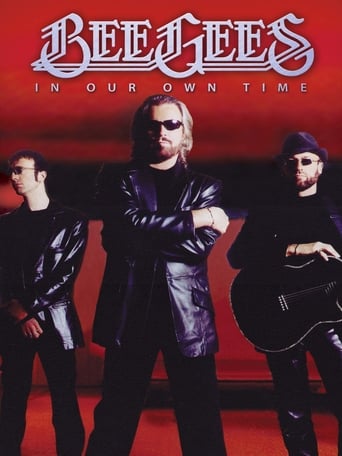rooprect
Having grown up listening to my big brother's 70s hard rock records (Van Halen, AC/DC, Black Sabbath), I was programmed at a young age to hate disco and anything remotely sounding like it. Suffice it to say I was never a Bee Gees fan, and even though infectious grooves like in "Stayin Alive" would dance in my head I denied them feverishly. Saturday night feverishly.Disco died a horrible death in the mid 80s (I remember the "Bee Gees free weekends" on the radio, mentioned in this movie), and that was the last I heard from the Bee Gees until yesterday when I bought this movie on a whim.Right off the bat, I was surprised & captivated. Did you know the Bee Gees were a successful psychedelic rock band in the 60s? I didn't. Did you know they were managed by the same people who managed The Beatles and thus had a very Beatles-esque sound & look for half their career? I didn't. By walking us through the story chronologically, we learn that the Bee Gees were so much more than simply the Saturday Night Fever soundtrack which made them famous/infamous. And yes, they are quite capable of singing in their full male voices, not just high pitched falsetto (seriously, I didn't know that). Songs "New York Mining Disaster" and the rock opera album "Odessa" were right in line with other 60s British masterpieces by The Beatles, The Who and so forth.Then disco arrived, or might it be fair to say The Bee Gees defined disco, in the 70s. In the film, Robin Gibb makes a very profound statement about that. He said when they went to Miami they were intrigued by the sound of funk, soul and R&B. Being British, they didn't realize the American cultural boundaries between "black music" and "white music", so they just jumped in with songs like "Jive Talking" and such. I suppose it would've seemed pretentious for a bunch of American white guys to go so boldly into that territory. But a group of Brits, gosh there are no rules. And that's how we came to know the Bee Gees we adore or abhor.The film goes on to describe how they evolved further as musicians, songwriters and producers. In the 2nd half we also learn about the tragedies in their lives (I won't say what, in case you live in a cave & missed all the headlines)."The Bee Gees: In Our Own Time" has a lot of great interviews with the guys, clips of 2 dozen songs or more (no full songs, but a good 30 seconds each) and at least 1 great studio scene as they were recording the song "Tragedy" - a remarkably clear behind-the- scenes look at the creative process. I got the feeling that this film is perfect for people like me who know nothing about the Bee Gees and where they came from. This is the sort of film you show to your cranky disco-hating uncle to convert him by showing that disco was simply a logical progression of rock music from the meeting (clashing?) of opposite styles. And isn't that what rock music has always been about?To hardcore Bee Gees fans, there may be nothing new here. But it's still very well put together & interesting. In short, I can't think of anyone who would *not* enjoy this production, unless you just don't care for contemporary music in general. Other worthwhile documentaries about 70s music: "ABBA - Super Troupers" which gives some great insight into the career, drama & mild psychosis of one of the world's greatest hit machines, "Standing in the Shadows of Motown" about the unsung heroes who made the backing tracks behind the superstars, and my favorite musical documentary: "Anvil - The Story of Anvil" an unintentionally hilarious view of a hard rocking band that didn't quite make it.
